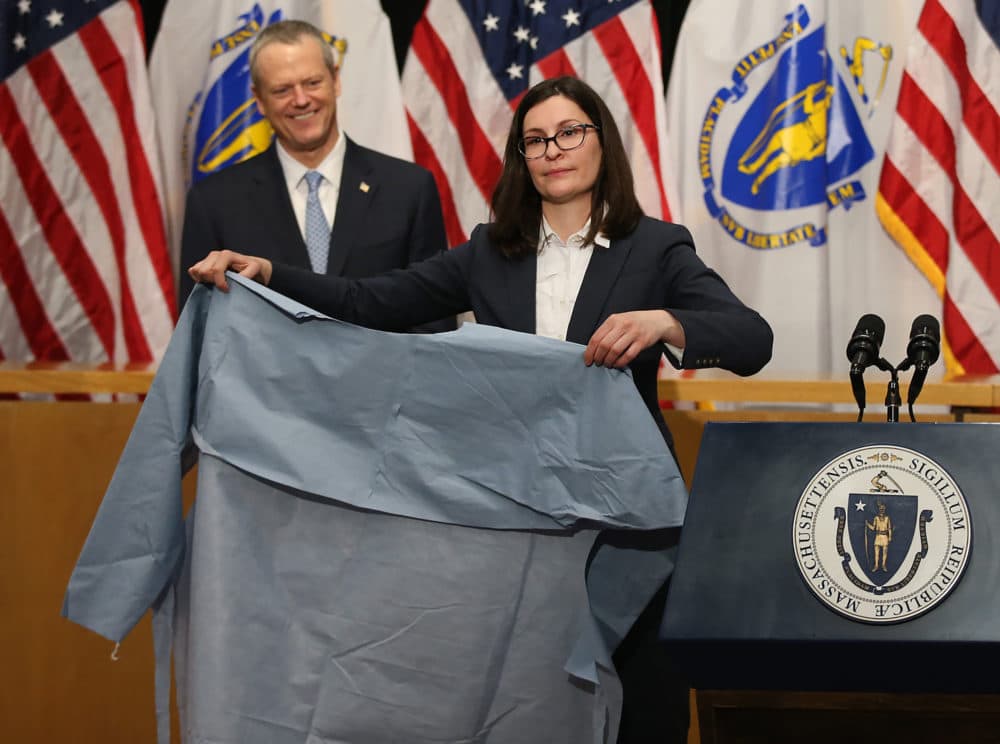Advertisement
Coronavirus Coverage
How A Factory In Lawrence Went From Athletic Apparel To Medical Gowns

Gov. Charlie Baker is asking Massachusetts manufacturing companies to help make much-needed personal protective equipment, and one of the first to answer the call is 99Degrees, a Lawrence-based maker of athletic apparel that is shifting to produce medical gowns.
"I'm proud of my team and our willingness to put down everything and dedicate ourselves to this response and to our team's health and safety," 99Degrees founder and CEO Brenna Nan Schneider said Monday at a news conference with Baker.
Only a short time ago, Schneider didn't think such dedication would be necessary. Instead, she thought the coronavirus outbreak might lead to some extra business because apparel companies were having supply-chain problems in Asia, and that had them looking for alternatives closer to home.
"We've just had a lot of inquiries from brands that ... have a combination of work overseas and domestically, and want to use the domestic option to fill in the gaps," Schneider told WBUR in early March. "So, for brands that are already working with us and they might want to increase their U.S. production to offset what they're losing overseas, that makes sense. And we're able to do that."
Things changed quickly, however. On March 23, Baker ordered all non-essential businesses, like 99Degrees, to close their doors.
In an interview that day, Schneider said she had already started thinking about adapting her factory to produce some kind of personal protective gear. She knew the demand was high. And, suddenly, converting the factory into an essential service was the only way it could stay open.
"We're getting calls all day from hospitals and doctors and brands and the state's emergency response team to try to figure out how we can help," Schneider said. "One of the things that I'm weighing right now is — it's an ethical question of, you know, being open and therefore putting my team at risk and also the community at risk by having manufacturing open.
"We have a very strong, very loyal, very committed team. And I know that if I make a decision that many people will follow. And, so, my first gut check has to be: What is right for my team in this moment? And then second, of course: What is right for the broader community? I mean, we we have to respond and be helpful. And we're in a position where we can be."
Advertisement
Schneider considered making masks but determined that 99Degrees, as an apparel maker, could more quickly pivot to gowns.
At the news conference, she credited the state’s Manufacturing Emergency Response Team with assisting the conversion and said she is grateful for the opportunity to apply for public funding to help offset the cost.
"This is not the time to learn and make mistakes," Schneider said in a third interview with WBUR. "This is a time to use what you know and do it well. And, still, there's a lot of learning. I mean, to learn all these FDA regulations, to line up the supply chain of these materials — it's a completely different supply chain than we're typically working in."
Most of 99Degrees' 150 factory workers, who were furloughed for several weeks, are returning to produce the gowns. Schneider said they have to adapt, too.
"We have a new process," she said. "Everyone lines up in the door, and then we have marks throughout the entire factory, through all of our aisles. So, no one can be closer than 6 feet. That includes when they're coming in to get their temperature taken and move to punching in."
Schneider said 99Degrees can produce 500,000 or, perhaps, 1 million gowns per month. It's a big help, but she said it won't be enough to meet the Massachusetts medical community's needs.
"It's heartbreaking," she said. "People will call and say, 'We need two million in the next two weeks. We need 20 million over the next XYZ weeks. The demand is unreal. And it's, it's hard. I mean, we're doing the best we can to scale as fast as we can."
This segment aired on April 14, 2020.
